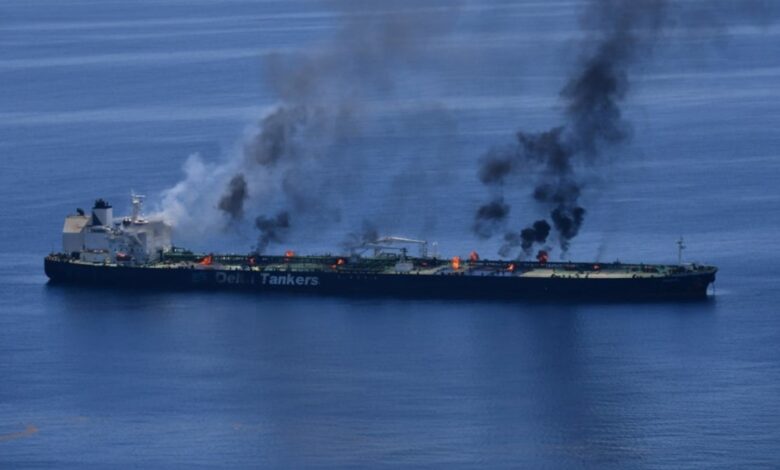Amid Warnings of Imminent Disaster, Fire Continues to Rage on Ship “Sounion” Off the Coast of Yemen

Yemen Monitor /Newsroom
The European Union Naval Force in the Red Sea, ASPIDES, announced on Monday via X that a fire continues to burn aboard the Greek-flagged ship “Sounion” since August 23rd, following an attack by the Iranian-backed Houthi group in Yemen.
The statement added that “so far, there have been no clear signs of an oil spill,” urging all ships in the area to exercise extreme caution, as the “Sounion” poses an imminent maritime and environmental threat.
ASPIDES stated that the “Sounion” remains anchored in the same location in international waters, emphasizing that “this type of attack not only threatens freedom of navigation but also the lives of seafarers, the environment, and the lives of all citizens living in the region.”
On Wednesday, three projectiles hit the oil tanker “Sounion” off the coast of the Yemeni city of Hodeidah, resulting in a fire on board and a loss of engine power, according to the UK Maritime Trade Operations (UKMTO), which is operated by the British Royal Navy.
The European Union mission in the Red Sea announced on Thursday, according to France Press, that it had evacuated the tanker’s crew a day after it was damaged in an attack off the coast of Hodeidah, which is controlled by the Houthi rebels in western Yemen, warning that the ship posed an “environmental hazard.”
According to the Hellenic Shipping Federation, the “Sounion” is owned by the Greek shipping company Delta Tankers and was carrying a crew of 25 people, including 23 Filipinos and two Russians. It had sailed from Iraq and was headed to a port near Athens.

The “Sounion” is the third ship owned by Delta Tankers to be attacked in the Red Sea this month, following the “Delta Blue” and “Delta Atlantica,” according to shipping data.
The Red Sea is facing an imminent environmental catastrophe after the Houthis, backed by Iran, blew up an oil tanker carrying 150,000 tons of crude oil, which could lead to a massive oil spill threatening to destroy the marine ecosystem in the region.
On Saturday, the US expressed deep concern about the Houthi attacks on the oil tanker “MT Sounion,” with State Department spokesperson Matthew Miller saying that “continued Houthi attacks threaten to spill one million barrels of oil into the Red Sea, which is four times the size of the Exxon Valdez disaster.”
Miller added in a statement that “while the crew has been evacuated, the Houthis show intent on sinking the ship and its cargo in the sea.”
Miller pointed out that “through these attacks, the Houthis have made clear that they are willing to destroy the fishing industry and regional ecosystems that Yemenis and other communities in the region depend on, just as they have undermined the delivery of life-saving humanitarian aid through their reckless attacks.”
The Houthi group has been launching attacks on commercial ships in the Red Sea since last November, claiming they are targeting ships affiliated or heading to Israel, although many of the ships they have attempted to target have no connection to Israel.
Since last January, the US and British forces have been launching strikes on Houthi-controlled sites in Yemen in an attempt to deter them and protect maritime navigation.
On Friday, the US Central Command (CENTCOM) announced the destruction of a Houthi missile system supported by Iran in a Houthi-controlled area in Yemen.
CENTCOM said in a statement on X that “this missile system was determined to pose a clear and imminent threat to US forces, coalition forces, and commercial shipping in the region.”





